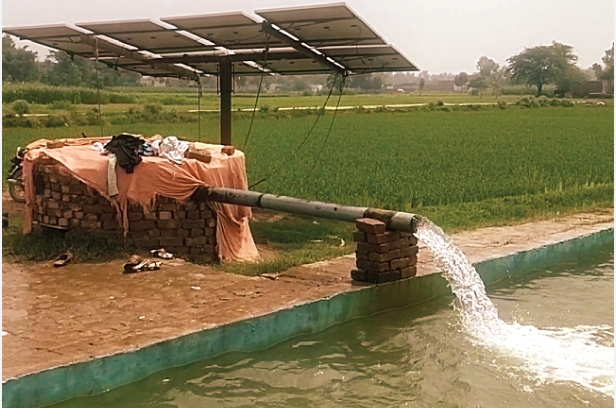Solar Energy Initiative in Balochistan to Replace Diesel-Powered Tubewells

Quetta:The federal and Balochistan governments have announced a groundbreaking initiative to transition over 28,000 diesel-powered tubewells in Balochistan to solar energy. This move aims to reduce the burden of electricity subsidies and enhance agricultural practices in the province.
The initiative, announced during Prime Minister Shahbaz Sharif’s visit to Quetta, involves a collaborative effort between federal and provincial authorities. Under the agreement, the federal government will allocate 70% of the project’s cost (approximately 55 billion PKR), while the Balochistan government will contribute the remaining 30% (around 16.5 billion PKR).
Farmers utilizing registered tubewells for agriculture will receive a substantial incentive of 2 million PKR each, facilitating the purchase of solar panels capable of generating over 500 watts. This transition is expected to enable the extraction of groundwater from depths up to 700 feet using solar-powered machines, effectively enhancing irrigation capabilities.
While the initiative promises to alleviate the financial burden on governments due to diesel subsidies and address water scarcity issues, experts caution about potential environmental and social impacts. Concerns are raised regarding the sustainability of groundwater resources and the need for effective management strategies to prevent over-exploitation.
Abdul Rahman Bizenjo, Secretary-General of the Landowners Action Committee, hailed the initiative as a historic step towards resolving longstanding issues faced by farmers. He emphasized that besides saving billions in subsidies, the project would ensure adequate irrigation for crops, mitigating substantial losses incurred due to water shortages during planting seasons.
Despite the benefits, experts highlight the risks associated with increased solar energy usage potentially exacerbating water depletion. They stress the importance of implementing regulations to monitor water usage effectively and formulate policies at both national and provincial levels to mitigate long-term adverse impacts.
Dr. Bashir Ahmed Agha, former Director-General of Water Management and Agriculture Engineering Department in Balochistan, underscored concerns about potential adverse effects on underground water reserves due to increased reliance on solar energy. He warned that unchecked water usage could accelerate the decline of underground water levels in regions like Quetta, Pishin, and other districts.
The initiative’s proponents argue that solar-powered tubewells offer temporary benefits to landowners but caution about the long-term consequences. They advocate for metering systems on solar-powered tubewells to regulate excessive water use and prevent further depletion of underground water resources.
Reports from the International Food Policy Research Institute (IFPRI) and Pakistan Agricultural Assessment Program (PAAP) have highlighted that agricultural reliance on tubewells powered by solar energy has led to a significant 120% increase in underground water usage between 1996 and 2017. The initiative aims to reverse this trend, ensuring sustainable water management practices for future generations.
In conclusion, while the solar energy initiative holds promise for modernizing agricultural practices and reducing financial burdens on governments, it necessitates careful monitoring to avoid exacerbating existing environmental challenges. Balochistan stands at a critical juncture in balancing agricultural needs with sustainable water management strategies amidst evolving energy transitions.






